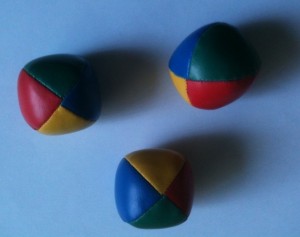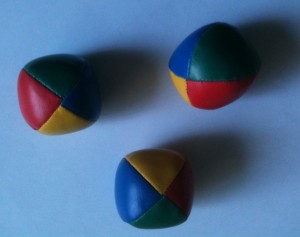Yesterday I was doing a garage sale. Always nice to clear out stuff you don’t need.
It was a fairly busy day but there were points in time when no customers were around. Instead of just fiddling around on my iphone (alright I did a bit of that too) I decided to practice a new skill.

Juggling vs. Hand Balancing (How these skills are different)
Juggling.
Not kettlebell juggling, something I’m already quite good at, but just tossing three small balls around. It was one of the items we were selling, and to pass the time I picked the balls up and got started.
It may surprise you but this is something I never had really done before.
Within a couple minutes I was able to get the three balls going at once. It wasn’t pretty but I was having some success. By the end of the sale I could easily keep them going and hit a streak of about 30 or 40 tosses.
I even decided to keep the juggling balls so that I could practice more in the future.
Now this isn’t something I plan on doing all the time. Nor do I want to go after it and become a great juggler. But it was fun to pick up a new skill from scratch.
I want to relate this to hand balancing. One of the reasons hand balancing is a harder skill to work on then most is because on top of the skill you need strength and endurance.
This means you can only practice so much or so long before you get to the point where your body can’t handle any more.
Overtime, you can increase this amount. And certain skills take a lot less that others (the regular handstand versus handstand pushups, for instance). But no matter how you cut it, it is a very physical skill.
While I could juggle for hours without spending too much energy, the same could not be said for hand balancing.
So when you do practice you have to do it smart. Being able to get results in a short amount of time is going to get you further along overtime than needed to practice for long stretches at a time. For this reason doing short practices throughout the day may be your best bet.
Of course, if you have built up to it, then spending an hour or two can get you real far.
Having the right roadmap and way to progress into these skills is also essential. For the best material on all hand balancing skills, check out the Hand Balancing Mastery Course.
They say practice makes perfect. I would add that smart practice makes perfect faster.
Good Luck and Good Hand Balancing,
Logan Christopher


Comments
good article… I am a good juggler who dabbles with hand-balancing so I am coming from a different perspective… my goal for 2010 is to hold a handstand (still) for 30 seconds. I have gotten up to 14 seconds and my average is probably 4 seconds right now… thanks for the tips
-Bob
I found your comments interesting and right on line. I taught school for thirty years, but had a handbalancing and a juggling act.
Too much practice can actually make things worse and it is good to switch skills every few minutes. We all go through the I will give it one more try syndrome.
I worked two man tricks as well and in a trio with the balancing. I spent a lot of time on onehanders and did them on a cane, legs apart, together, hand out and hand at the side.
Anyway, I enjoy your emails. Thanks for sending them.
Bob Good
Interesting – I found some juggling balls at a church fete later last year and one day I got around to having a go, and it is indeed a lot of fun. At first I found it a very strenuous activity – mentally, not physically, of course – and more than a few minutes at a time really jumbled my brain up. I needed days or a week’s “rest” if I did too much.
As I built mental work capacity for it, though, this changed, and now I can juggle for long periods almost every day and not get burnt out – so long as I keep changing things around and trying different things.
That said, it’s not the fastest way for me to progress with it, and something like 20 minutes a few times a week is optimal for me.
Many skills I progressed the fastest at I did for just a few minutes once a week, and progressed in leaps and bounds – doing it more than that sent me backwards quickly. Others, I worked for hours and hours for consecutive days and it didn’t harm me.
One must be able to judge how, and how much, one can train a skill before it becomes counter productive – just “listen to your body”, as they say. This will vary between individuals and between skills – one can normally determine a pattern though. As in, what type of mental or physical demands you can tolerate well, and what ones you can’t.
Anyway… a great juggling act with a lot of handbalancing and other body movement: https://www.youtube.com/watch?v=FE1s1L0fjes
@RT: Thanks for sharing that video, that’s some great juggling and an interesting take on it.
You touched on something I haven’t written much on, and that’s the mental capacity to practice. Listening to your body is key and I’ll have more on that later.
Hey Logan,
Good job on learning to juggle instead of playing around, although juggling 3 balls is not too hard, I think it’s a fun skill to have.
I want to recommend to you a new skill to try. I don’t know if you can do it already, but like handbalancing it requires alot of balance; unicycling. A bit harder than learning how to juggle, but to me it’s one of the most fun things you can do and you can do it right outside your house.
If you don’t know much about unicycling, I’ll fill you in a little bit. Like bicycling, there are many different styles the biggest ones include street, freestyle, trials, mountain unicycling, and distance/touring. So there’s pretty much something for everyone. I think you might have fun with it if you haven’t already tried it.
You can get an idea of what it’s like if you search YouTube for “Dan Heaton mountain unicycling” and watching his video for the columbia commercial.(it’s like the first video I think).
Anyways, I hope it interests you and good luck on your handbalancing and other activities.
Erick
Pingback: Handstand Endurance | Lost Art of Hand Balancing